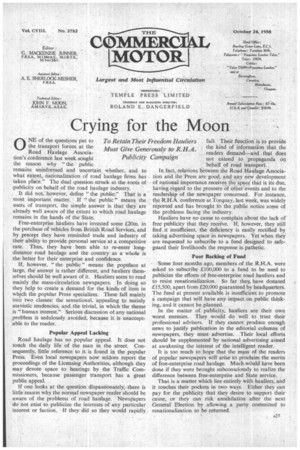Crying for the Moon
Page 29

If you've noticed an error in this article please click here to report it so we can fix it.
ONE of the questions put to To Retain Their the transport forum at the Must Give Genc Road Haulage Associa tion's'conference last week sought Publicity the reason why "the public.
remains remains uninformed and uncertain whether, and to what extent, nationalization of road haulage firms has taken place." The dual question struck at the roots of publicity on behalf of the road haulage industry.
It did not, however, define "the public." That is a most important matter. If "the public" means the users of transport, the simple answer is that they are already well aware of the extent to which road haulage remains in the hands of the State.
Free-enterprise hauliers have invested some £20m. in the purchase of vehicles from British Road Services, and by precept they have reminded trade and industry of their ability to provide personal service at a competitive rate. Thus, they have been able to re-enter longdistance road haulage and the country as a whole is the better for their enterprise and confidence.
If, however, "the public" means the populace at large, the answer is rather different, and hauliers themselves should be well aware of it, Hauliers seem to read mainly the mass-circulation newspapers. In doing so they help to create a demand for the kinds of Item in which the popular Press specializes. These fall mainly into two classes: the sensational, appealing to mainly atavistic tendencies, and. the trivial, in which the theme is "human interest." Serious discussion of any national problem is sedulously avoided, because it is unacceptable to the reader.
Popular Appeal Lacking Road haulage has no popular appeal. It does not touch the daily life of the man in the street. Consequently, little reference to it is found in the popular Press. Even local newspapers now seldom report the proceedings of the Licensing Authorities, although they may devote space to hearings by the Traffic Commissioners, because passenger transport has a great public appeal.
If one looks at the question dispassionately, there is little reason why the normal newspaper reader should be aware of the problems of road haulage. Newspapers do not exist to publicize the interests of any particular interest or faction. If they did so they would rapidly Freedom Hauliers fail. Their function is to provide the kind of information that the readers demand—and that does Campaign not extend to propaganda on behalf of road transport.
In fact, relations between the Road Haulage Association and the Press are good, and any new development of national importance receives the space that is its due, having regard to the pressure of other events and to the readership of the newspaper concerned. For instance, the R.H.A. conference at Torquay, last week, was widely reported and has brought to the public notice some of the problems facing the industry.
Hauliers have no cause to complain about the lack of free publicity that they receive. If, however, they still find, it insufficient, the deficiency is easily rectified by taking advertising space in newspapers. Yet when they are requested to subscribe to a fund designed to safeguard their livelihoods the response is pathetic.
Poor Backing of Fund Some four months ago, members of the R.H.A. were asked to subscribe 000,000 to a fund to be used to publicize the efforts of free-enterprise road hauliers and to resist renationalization. So far they have donated £15,500, apart from E20,000 guaranteed by headquarters. The fund at present available is insufficient to promote i campaign that will have any impact on public thinking, and it cannot be planned.
In the matter of publicity, hauliers are their own worst enemies. They, would do well to trust their professional advisers. If they cannot produce enough news to justify publication in the editorial columns of newspapers, they must advertise. Their local efforts should be supplemented by national advertising aimed at awakening the interest of the intelligent reader.
It is too much to hope that the mass of the readers of popular newspapers will arise to proclaim the merits of free-enterprise road haulage. Much would have been done if they were brought subconsciously to realize the difference between free-enterprise and State service.
That is a matter which lies entirely with hauliers, and it touches their pockets in two ways. Either they can pay for the publicity that they desire to support their cause, or they can risk annihilation after the next General Election by allowing a party committed to renationalization to be returned.




































































































